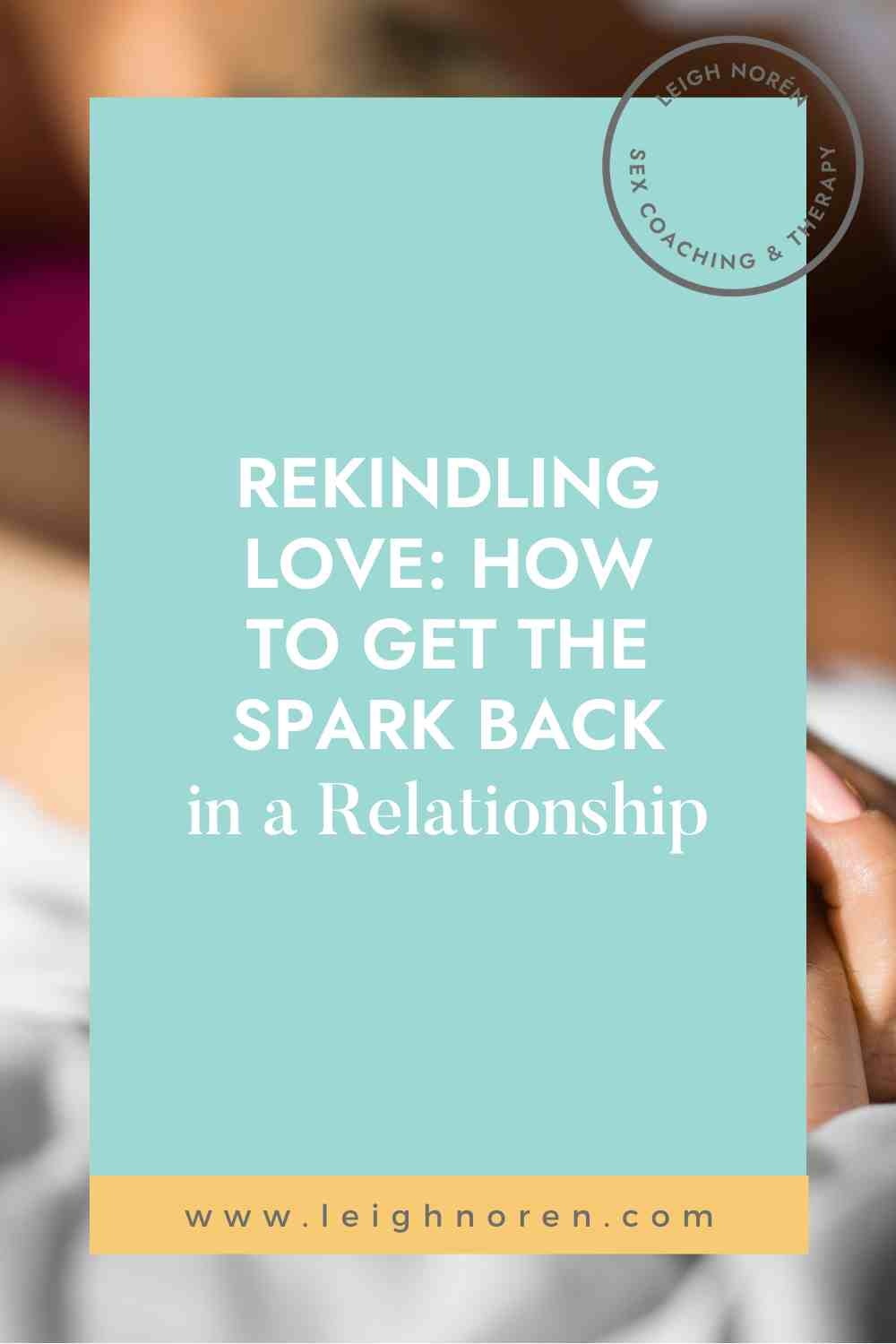How to Rekindle a Relationship When the Spark is Gone
First published 23rd April, 2024. Updated 1st November, 2024.
15 minute read
Wondering how to rekindle a relationship that’s lost its magic can be a lonely place. It’s often wrought with worries and anxieties about whether rekindling love is even possible.
But based on my years of experience working with individuals and couples struggling with their sex lives and relationships, I can tell you that it is – and in this article, I’ll explain why passion subsides and how to get the spark back.
In this article
Why we experience diminished passion
When you’re figuring out how to get the spark back in a relationship, it’s important to address why the spark is even gone in the first place.
Because there are many reasons we experience a lack of sparks. Below are a few of the most common ones I see when I help my clients with their sexual health as a sex therapist and intimacy coach.
We believe “real” romance & love shouldn’t need work
Our thoughts are powerful. They affect our mood, how we feel about ourselves and others – and also, what we do.
This means in any given situation, a lot of our behaviours have to do with our thoughts. This includes the thoughts we’re aware of, but equally, the ones we’re not.
So, what you think and believe about your relationship, whether consciously or subconsciously – will affect your relationship. And this can be both great and not so great.
When the passion of the early days subsides, it’s easy to feel like reigniting the spark is doomed. After all, decreased desire and a sense of slight boredom must mean something, right?
Well – not necessarily.
Carswell & Finkel did a series of experiments, proving why our beliefs about relationships matter. The authors state: “(…) holding a decay belief of passion likely reduces commitment at even average levels of passion, suggesting that believing passion does not revive may lead to even a modest cool-off of initial passion, causing alarm and doubts about the future.” (Carswell & Finkel, 2018).
In a nutshell – if you believe that relationships can’t be brought to life again – you run the risk of ending them prematurely.
This means you might lose out on a relationship that could have been satisfying in the long term. Perhaps, even life-long.
On the other hand, if you believe that magic once lost can be regained, you stand a much larger chance of turning that belief into a reality.
This is because a belief about the possibility of recapturing passion positively affects how committed you feel to your partner. And with more commitment comes more motivation to create positive relationship behaviours—ones that sustain your bond and keep things interesting. This can effectively bring back that giddiness of the early days.
Chore commanding doesn’t lead to romance
Beyond our thoughts getting in the way of our longing for rekindling love – there are lots of other factors, like the roles you play in managing household duties and chores.
Whether you’ve been living together for 2 months or 2 decades, chances are you’re knee-deep in this un-sexy situation. Taking care of a home together is inevitably one of the biggest reasons couples fight.
Deciding who is going to empty the dishwasher, how clean the bathroom should be, and when to wash the windows isn’t exactly the stuff erotic fantasies are made of. At least not for most of us!
Inevitably we end up in project-leading roles; with one person deciding the how and when.
It’s exhausting and, over time, can lead to built-up resentment. This is especially true if you’re the partner who does the majority of the housework and it goes unseen and underappreciated.
Inhabiting the role of project leader can even lead to feeling more like your partner’s parent, than lover. And when this occurs, of course you’re scrambling to find ways to get the spark back in a relationship. Because only ever discussing (and arguing) about practicalities and nagging one another leads to less connection over time.
We stop appreciating the things that work
In the infatuation phase, we often can’t get enough of each other. You might even miss your partner when they sneak off to the toilet!
But as those rose-tinted glasses slowly get removed, it’s easy to stop seeing all the things you love about your partner.
In fact, a lot of couples only come to see the stuff that isn’t working in their relationship. They get hung up on their partner’s annoying qualities; the way they chew, the stories they tell, or their kissing style.
And this isn’t strange, even though it’s sad. Life is hard and with increasing demands, many of us find ourselves tapped out. Too tired to really connect at the end of the day.
When we’re tired and stressed – we’re usually quick to irritate. Once annoyed, it will be hard to appreciate almost anything, let alone our partner. Who still hasn’t made the bed by the way(!).
But it’s also a fact of life that appreciation and romance ebbs and flows. No matter how amazing your partner (or you) may be, you will get annoyed.
You will be disappointed sometimes.
You will wonder if the grass is greener from time to time.
When your thoughts are focused on everything you dislike and want to change, instead of the stuff they still do get right – of course you’re asking yourself how to rekindle the spark in your relationship. And the answer might just be focusing on the good – not solely the bad.
Perpetual arguments tear us apart
69% of conflicts in relationships are perpetual. This means most of the things we argue about are actually unsolvable. But before you let this throw you into a pit of despair – let’s look at this positively.
Because this means you’re not alone in finding yourself trapped in the same conflict again and again. It also means the solution to stop arguing isn’t necessarily switching partners.
Sure, the content of the conflicts might be different with someone else – but conflict itself is inevitable.
And healthy.
It’s how we argue that matters the most.
However, just because fighting doesn’t necessarily mean you’re wrong for each other, it doesn’t mean it’s inherently romantic either.
When you argue it rarely produces a desire to be close, to be vulnerable, to have intimate sex.
It pushes you further and further apart – creating a chasm in your twosome. Because fights trigger anger, and the emotion of anger motivates us to set boundaries and put up walls. And most of the time, this isn’t conducive to sex.
You’ve stopped having sex
When you’re determining how to rekindle a relationship, thinking about your sex life is usually a good place to start.
One of the biggest differentiators between a monogamous romantic relationship and friendship – is sex. Most of us are alright with our partner sharing jokes, stories, and quality time with others, but sex is where we draw the line.
Because of this, couples are often left feeling particularly vulnerable when the sex has stopped. It can set off a cascade of alarm bells within;
“Why aren’t we having sex anymore?”
“Does this mean we’re doomed?”
“Why don’t they ever initiate sex?”
“Am I unattractive?”
“Have I fallen out of love?”
And while those things could be true – they definitely do not have to be. Take it from a sex therapist and intimacy coach who specializes in low libido and mismatched sex drives – a sexless relationship doesn’t have to be the end. If your partner doesn’t want to be intimate (or if you no longer do), there’s still lots you can do.
Sexual desire is way more complicated than we’ve been led to believe. It’s also normal for desire to wax and wane (even if you’re in love).
And as with so many other things in life, it’s how we respond to this discrepancy in desires that matters the most.
Because when you know why you’re stuck in the roommate phase of marriage – you can take steps to change it. Even if you’re struggling simply talking about the lack of sex right now.
WANT YOUR SEX DRIVE BACK?

My free resource The Desire Test helps you take that first step towards an increased sex drive, by understanding your decreased desire.
Take the 10-page assessment quiz, get the answers you need to understand what’s standing in the way of your desire, and get free sex and relationship tips directly to your inbox. You can unsubscribe at any time.
8 tips for getting the spark back in your relationship
1. Work out why it’s gone
While it may be tempting to try out a few quick tips when you’re wondering how to get the chemistry back in a relationship – starting with why it’s gone shouldn’t be skipped.
This is because understanding what has changed and when, gives us important clues. Clues on what needs changing and how to go about it.
Compare it to having back pain – sure you can do some strength training to see if it helps. But if you learn the pain is actually originating from your hip, you’ll be on the path to recovery a heck of a lot faster by tending to your hip – rather than your back!
My free 13-page resource, The Guide For Intimacy, can help put you on the path to more understanding.
2. Learn how to fight
We’ve already established fighting doesn’t have to be bad and can be healthy. But learning how to fight fair is going to make a world of difference to:
- How quickly you solve an argument
- How close you feel after the conflict is over
- How respected, seen, and loved you both feel in your overall relationship
- The longevity of your relationship
- Prevent resentment which otherwise erodes a relationship over time
When you know there’s nothing wrong with you and your partner for getting stuck in the same conflict – you can approach things differently. In ways where you can still hold on to that spark or re-create it.
One important thing to keep in mind when fighting is to always approach it from an “I” perspective – not a “you” perspective.
This means saying things like “I get sad when I notice you scrolling your phone while I tell you about my day”, as opposed to “You always scroll on your phone when I tell you about my day and I’m so goddamn tired about it”
The first example opens up space for a less defensive conversation. The second example creates conflict within seconds.
You can find more tips here on what fighting about sex really means and concrete steps on how to stop.
3. Get curious
When you’ve been together for a long time, it’s easy to feel like you know everything about one another. And in a way – you do.
You know your partner likes cream cheese on a bagel but not on toast.
You know they hate when you leave the toilet seat up but conveniently forget to put it down themselves.
You also (unfortunately) know they like to clip their toenails while watching Netflix on the sofa as opposed to in the bathroom.
But even though you know so much about them, I’d be willing to wager you don’t know it all. And you particularly don’t know about all the thoughts they don’t share with you. All the ideas, beliefs, and philosophies they might be cooking up and changing their mind on all of the time.
Because all people change. Some more than others. But the gist is – when you want to know how to rekindle a relationship – you need to start getting curious again.
You need to approach your partner and their inner world with as much fascination as you did at the beginning. That is what breaks the negative cycle. That is what fundamentally changes your outlook on your relationship and your partner.
Once you start to ask them questions instead of assume how they feel about something – you can start to fall back in love again.
And if you need help doing this, my free 14-page resource, Intimate Q&A, gives you everything you need for a truly great date night. With thought-provoking quotes and corresponding questions, you will ask each other questions you might never have asked before – and get closer emotionally.
4. Foster a sense of play

Rekindling the spark is also about having fun together again. With mundane chores, screaming children, and never-ending deadlines at work, it’s easy for the fun to slip away.
When I work with people who have lost their desire for sex, this is often one of the core issues at play. Because when we can’t stop arguing, we’re no longer having sex, or we don’t feel close – we’re rarely having fun together either.
Fun and play aren’t just for kids – they’re incredibly important for adult’s mental well-being, too.
Cracking jokes, laughing together, and being cheeky infuses life into a relationship.
It creates closeness and a feeling of belonging. It releases feel-good hormones that lower stress and have us seeking connection again, effectively putting the question of how to get the spark back in a relationship to bed. Because it’s there again!
So instead of turning on that true crime documentary – put on a stand-up show. Share something funny that happened to you today. Book a date night where you do something none of you have done before and can laugh at how utterly ridiculous you look while doing it.
Be proactive about it and soon you’ll find that sense of play is back, and with it – a renewed spark.
5. Do what you used to do
When you’re wondering how to get the spark back in a relationship, you don’t always have to look so far. While novelty and adventure are often important – sometimes you just need to remind yourself of what you used to do. And then start doing it again.
Because a lack of love or appreciation doesn’t come from nowhere.
It’s often the small breakdown over time of gestures and moments that leads to a relationship’s demise.
When you compare where you’re at today with the way things used to be; what comes to mind? Did you perhaps kiss each other hello and goodbye? Did you call each other on your lunch break to talk about your day and not just practicalities?
Maybe you used to fall asleep together but now you can’t remember when that happened last? Partially because you’re always going to bed earlier to avoid having to say ‘no’ to sex yet again.
Whatever you used to do, see if you can start to get back to that place. It doesn’t have to be a huge, grand gesture – rather, small things often are likelier to have a bigger impact. At least over time.
Don’t be afraid to ask for what you want either. If your partner used to buy you that chocolate bar just because – share how you’ve been thinking about it lately and would love that again. Let them know how much it meant to you and they’re likelier to pick up the habit once more!
6. Introduce sexual novelty
How to get chemistry back in a relationship sometimes hinges on what you’re doing in the bedroom. And specifically, if you’ve been doing the same thing together for years and years.
While sexual novelty isn’t the cure-all for sexual problems (because if it was I’m pretty sure I’d be out of job at this point), it’s still pretty important.
You see, in order for sex to be pleasurable and satisfying, we need to be present for it. And when we’re having sex in the same way, same order, all of the time, it naturally gets harder for our brain to concentrate on the experience.
Without concentration – we start thinking about everything else; laundry, work, kids.
Before you know it, sex feels boring, and after a while, we start to dread it. Because why would you want sex that’s predictable and boring?
Introducing something new or switching up the order of how you do things infuses a sex life with much-needed excitement.
It doesn’t have to be big, but a small switch can still have a profound effect. Making both you and your partner more interested in having sex again soon – and making you feel like you’ve got flame back.
Because sex often creates what is known as “sexual afterglow”. And as sex researcher Justin Lehmiller shares; sexual afterglow (the look of contentment on a person’s face after sex) lasts about 48 hours(!).
15 minutes for 48 hours of feeling more loved up is a good return on investment!
7. Talk about sex
The answer to how to get the spark back in a relationship is sometimes about the unsexy conversations. Because while talking about sex can feel incredibly cringey, it’s nonetheless important.
Why? Because talking about it usually leads to better sex. Sometimes even more of it.
But this is easy to say and infinitely harder to do. Especially if the only other time you talk about it is when you’re arguing about the lack of it. Or you’re both tip-toeing around pretending you haven’t noticed you’ve stopped having it.
The thing is – to get out of a rut like this – you often need to address it first. You need to talk about why you’re no longer having sex and what’s needed for one or both of you to want to again.
You need to chat about how you’re feeling in the relationship at large. What you’re needing, hoping for, dreaming of.
Broach a conversation from this curious standpoint and you’re going to be in for a less defensive, more productive conversation. One where you can both be honest about you’re feeling about your sex life (or lack thereof).
8. Commit to 60 seconds of intimacy, 3 times per day
When you’re in the process of rekindling love it can sometimes feel like there’s not enough time in the day, or week, to get there.
To make this doable, you can commit to something we all have the time for – 60 seconds of closeness, three times a day.
This builds on the principle of ‘small things often’, and is a great way to start changing relationship habits. When sharing closeness several times a day, you’ll notice it becomes easier to reach for your partner’s hand, snuggle a little closer, or even steal a kiss before bedtime.
Because there’s not a glowering sense of disconnect between the two of you anymore.
It will also help change your thoughts about your relationship. And as we’ve stated before, they’re pretty important when it comes to recapturing the magic of the early days.
Examples of how to do this are sharing a long hug before work, having a quick cup of coffee together, or checking in on each other during the day with a short phone call.
Reigniting the spark in your relationship is possible
It can feel daunting to embark on a journey to get the passion back. And while it’s seldom a quick project – it can be a beautiful one.
Healing the past, moving on from resentment, and creating connection and closeness is one of the most profound things we will ever do in life.
Relationships are what make our lives. And if you want that intimacy with your partner again – putting in the work will be one of the bravest things you ever do. And hopefully one of the most rewarding, too!
If you’re looking for professional help from a sex therapist and intimacy coach with 7+ years of experience to do this – I’m right here, and I will tell you, step-by-step, how to get the spark back in a relationship.
In my in-depth, 9-month online sex drive course Re:Desire, I help you access your desire for more and better sex, and deep, emotional closeness.
Get a taste of what it’s all about (and my 4 actionable strategies for starting to get your sex drive back today, in my private podcast linked here).

Zero sex drive?
You’re not alone! Download the 10-page Desire Test to find out why your desire for sex is gone (and what to do about it).
Questions based on a variety of factors proven to negatively affect desire
Find out which factors are responsible for your low or non-existent sex drive
Get instant access to expert advice, delivered directly to your inbox when you download The Desire Test. Unsubscribe anytime.
WANT TO KNOW MORE ABOUT THE DESIRE TEST?
With 9 years of experience as a sex therapist and coach - Leigh helps her clients create stress-free, shame-free, pressure-free sex lives, through her unique combination of sexological science, & psychotherapeutic & coaching tools.
OTHER POSTS YOU MIGHT ENJOY
Copyright © 2019-2026 Leigh Norén. All Rights Reserved. | Website by Pinegate Road
Cookie policy | Terms & Conditions | Privacy Policy


